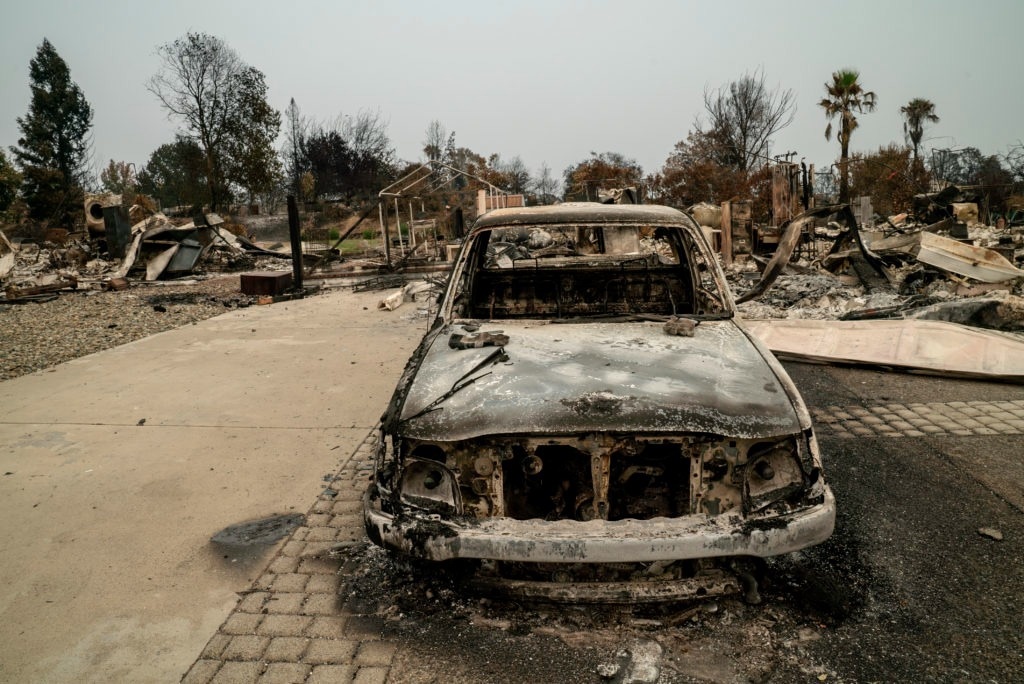Sep 16 2022Reviewed by Mila Perera
As wildfire occurrences have increased, as do the pollutants from burned watersheds in the water. This was noted by researchers in a review paper that indicates the requirement for more research in this field.

Remains of a house and car after the Carr Fire passed through the western edge of Redding, California, in 2018. Image Credit: Cecilio Ricardo/USDA Forest Service
Much less studied are the effects of fire burning not only forests and grasslands but also houses, vehicles, and other human-made material. There have only been a few studies of pollutants mobilized from these types of fires.
Stephen LeDuc, U.S. Environmental Protection Agency’s Center for Public Health and Environmental Assessment
LeDuc is a coauthor of the new paper published in Water Resources Research, AGU’s journal for original research on the mobility and organization of Earth’s water.
The paper emphasizes the water trends after wildfires as reported through 184 scientific papers from 1980. They found that stream flow usually increases following a wildfire, along with sediments and water temperature. Often, nutrients also increased, as well as some organic chemicals and toxic metals, which often reach concentrations up to 10 to 100 times higher than pre-fire levels.
Certain post-fire chemicals present in the water, such as arsenic, can also surpass regulatory limits in processed drinking water. The report additionally found higher levels of the carcinogen benzene in tap water after houses and vehicles were burnt in the town of Paradise, California.
Scientists also discovered increased metal concentrations in the ash from these fires, which could impact runoff.
The review discovered that little research had been conducted on the type of pollutants arising from urban wildfires. This resulted in a disadvantage for planners and water managers recovering from a fire.
“We point this out as a major gap in the scientific understanding of fire effects,” LeDuc stated.
In my view, the main reason for the knowledge gap is the challenge of setting up an urban water quality monitoring program on short notice, like after a fire. There’s plenty of interest, but at the end of the day, successful water quality monitoring efforts come out of projects that were approved in time.
Dennis Hallema, Hydrologist, Desert Research Institute
The impact of wildfires on the surrounding ecosystems was also examined in the study.
Fire frequency is increasing in places like in the western U.S. due in part to climate change, and there is potential for areas burned by fire to become longer-term stressors to water quality if the previous vegetation is slow to recover or fails altogether. [But] burned areas could be targeted for restoration efforts, such as erosion control or plantings.
Stephen LeDuc, U.S. Environmental Protection Agency’s Center for Public Health and Environmental Assessment
One restoration attempt after the Las Conchas Fire in 2011, published in the paper, was carried out by the Pueblo of Santa Clara.
The researchers note that they believe their review will aid communities and water quality managers plan for, and recover from, the effects of wildfires on their water.
Journal Reference
Paul, M. J., et al. (2022) Wildfire Induces Changes in Receiving Waters: A Review With Considerations for Water Quality Management. Water Resources Research. doi.org/10.1029/2021WR030699.
Source: https://www.agu.org/